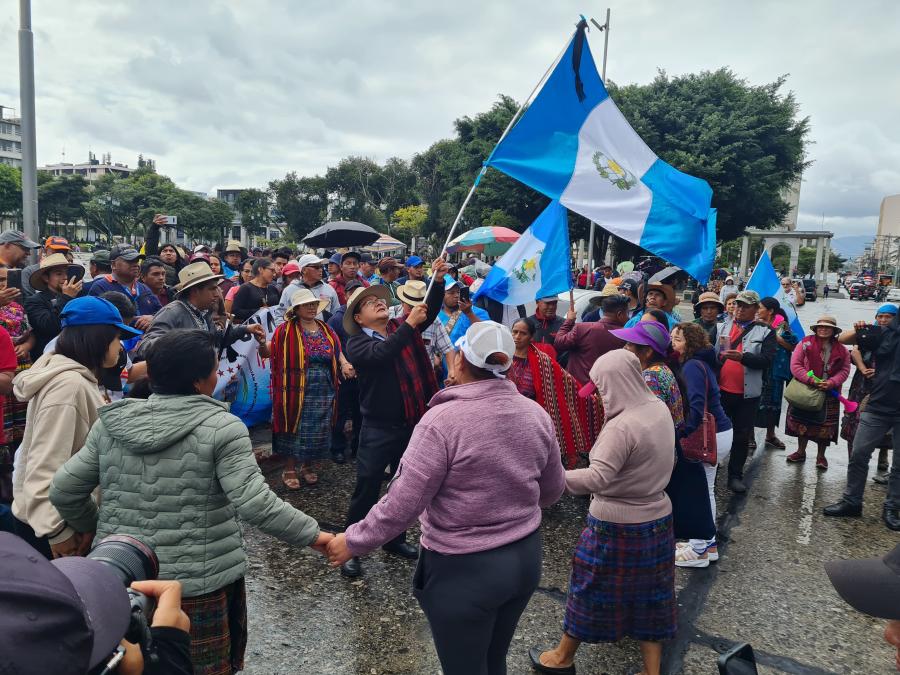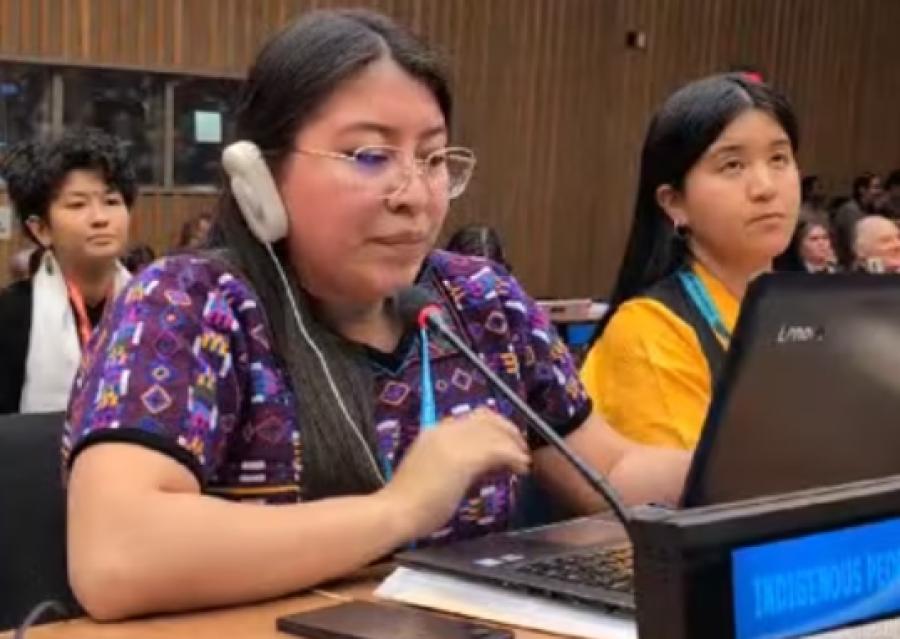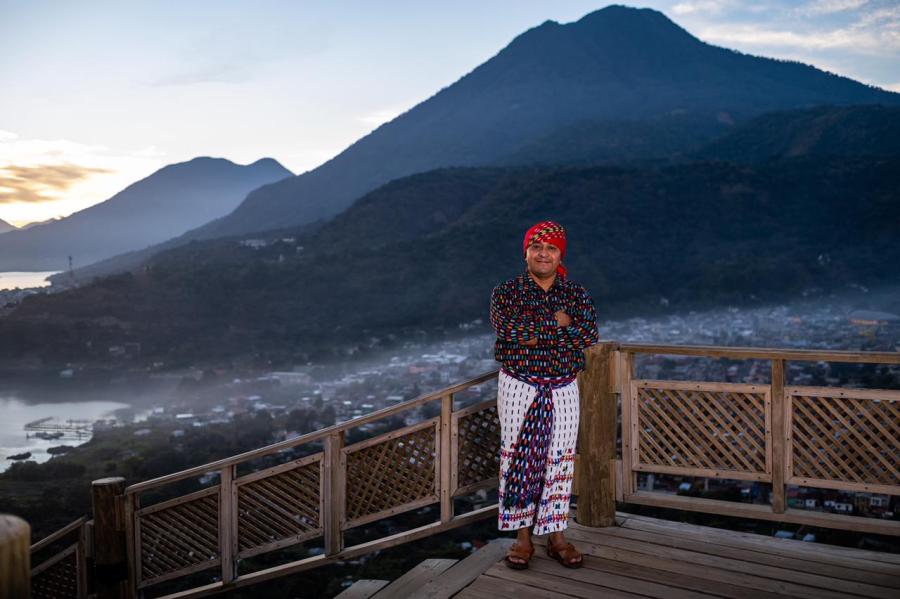Miguelito is nine years old, but I address him as “Señor Presidente” with only a hint of irony. Hearing the title makes him smile, but not with embarrassment. Miguelito was elected president by his peers, the members of the youth auxiliary group of Radio Sembrador in San Pedro la Laguna, Solola. He speaks with a self-confidence befitting his office. I think to myself, “This kid has a future.” The eight-member youth auxiliary group plans, produces, and broadcasts a live radio show every week, a radio show by the youth in the village for the youth in the village.
Their show is broadcast live every Saturday morning. Today is Friday, but Miguelito and two other members of the youth group are hanging out in the tiny radio station this morning because the teachers at their school are on strike. The three boys sit crowded onto a wooden bench next to the morning DJ, Vicky Garcia. The entirety of Radio Sembrador (un sembrador is a planter, a sower of seeds) is contained in a six-foot-by-six-foot room on a street one block from the Parque Central in San Pedro la Laguna. The broadcast booth consists of a table topped with two microphones, a small sound mixer, a computer, a CD player, and a few other electronic components from which a cable runs out the window and up a 25-foot-tall rebar tower mounted with an antenna in the back yard. This is community radio.
And it is illegal.
Better said, it is not completely legal. The Peace Accords of 1996 that drew a close to the decades-long civil war in Guatemala stipulated that, in the service of human rights and rights to free speech of Guatemalan citizens, local communities would have access to the airwaves. And yet, when the laws were ratified, the right to community radio was never set into the code. To someone from the developed world, access to community radio might not seem a central issue to be negotiated at the end of a bloody national conflict, but in the developing world generally, and Guatemala specifically, enabling members of a community to communicate with one another is crucial for maintaining both cultural identity and civic action. In Guatemala, with a troublingly high illiteracy rate and 25 different languages, radio is one of the primary means of communication, just as Miguelito and his friends have discovered.
I ask little Miguel and his friends why they do their radio show and what their show is about. El Presidente speaks for the three boys as the other two nod their heads in agreement: “We thought that the radio station needed a show especially for the kids in town. Everybody here listens to the radio, but before we started our show everything was just for adults. Now we have our own show. Last week on the show we got the kids in the town to pick up trash. There is an organization that we work with. Kids find a plastic bottle and pack it full of plastic bags and other garbage until the bottle is so full and tightly packed that it is hard. Then they can turn it in and get a notebook or a pencil to use in school. The organization then uses the full bottles to build houses. When we talk about it on the radio, lots of kids in town hear about it and participate.” He says it just like that, clear and unhalting. The kid is a born leader and a great communicator, and the community radio station provides a way for him to get his message out.
Nonprofit community radio plays an important role in the daily lives of thousands of Indigenous people like Miguelito and his friends in Guatemala. Francisco Xico, a Mayan priest from Patzicia who volunteers at his local community radio station claims that “the radio helps keep our culture and language alive.” Ancelmo Xunic, a Cultural Survival staffer, recognizes that “it is by the community, for the community.” “As an Indigenous woman,” Community Radio Ixchel volunteer Angelica Cubur Sul says, “community radio is the only place that I can express my views and opinions and be sure that they will be heard by the entire town. The mayor expresses his opinion on our radio, so do the police, and so do I.”
Last year, coordinated by Cultural Survival, community radio volunteers trained 326 other community volunteers in radionovela production, radio journalism, and use of the Internet to improve the radio content. These local volunteers are the people who operate the community radio stations in their own villages and keep them on the air. They volunteer their time, usually two hours a day, and are the lifeblood of community radio. It is through these volunteers (and the programs that they broadcast) that one million Guatemalans receive information crucial to their lives.
Programs like radionovelas or Miguelito’s children’s broadcasts allow space for Indigenous people to maintain their cultures. Thirty-six years of a civil war that took the lives of 200,000 to 300,000 Maya were not enough to drown out their culture, but globalization—be it English-language television programming coming from the United States or the Spanish-only, gigantic radio stations that beam their mass-marketed message across the nation—may, yet.
Manners of dress, traditional cultural celebrations, and the 22 Mayan languages spoken in Guatemala are being lost to the forces of international homogenization. The civil conflict couldn’t break these thousand-year-old bonds, but American Idol can. Standing on the ramparts against this onslaught are the small, 300-watt, community radio stations that remind those with greater wealth and power, “we are standing in your way.” And, refreshingly, their resistance is working. Languages once on the brink of extinction are coming back into common use. Traditional music is also experiencing a revival in Indigenous areas. Pride in the traje (traditional Mayan dress that is unique to each community) and in the sense of a people as sharing a common, historical bond is strengthening across this majority Mayan nation, and community radio, with its ability to speak directly to a pueblo, is a large part of that sense of rebirth. Moreover, the links between Mayan communities are also spreading and strengthening.
Starting 500 years ago, governing authorities in what is now Guatemala—whether Conquistadores or the Ladino power structure that has dominated the Guatemalan government since independence—intentionally sowed the seeds of discontent between different Mayan groups to divide, conquer, and subjugate. But building a nationwide network of community radio stations that share a common cause helps heal those ancient rifts. An educated citizenry is essential to the survival and the success of any democracy, particularly one as young and fragile as Guatemala’s. Having access to a means of public dialogue is of central concern on local issues like providing homework support to a community’s school children and national ones, like disseminating and discussing concerns about the economy, the environment, and public health.
With technical assistance from Cultural Survival, Guatemalan community radio production staff created 286 radio programs over the course of the last year, featuring a wide range of topics, including Indigenous rights, environmental protection, sustainable agriculture, fair trade, health, and methods of political participation. Programs were recorded in Spanish, Mam, Kaqchikel, K’iche, Achi, Poqomam, and Tz’utujil. All of these programs were made in cooperation with local doctors, nurses, human rights workers, environmentalists, farmers, and other experts. The production, recording, and editing of the radio programs is all done at local stations, and the results are made available via CD, email attachment, or on the Cultural Survival website (www.culturalsurvival.org) to all other community radio stations in the network. Each radio station is independently owned and operated by the local community, and each one decides which programs it will broadcast, but the stations are working together to build a better nation. These prerecorded, nationally distributed programs make up only a small percentage of each member station’s offerings. The vast majority of the programming is live and local. The prerecorded public service announcements and miniprograms augment local programming, not replace it.
That local programming can be essential in many communities. For example, after Tropical Storm Agatha unleashed mudslides, washed away houses, flooded communities, and killed well over 100 people this past spring, Guatemala’s community radio stations took on a new and vital role: informing listeners, rallying volunteers, and helping organize the local relief efforts when the government agencies became overwhelmed and failed. In hard-hit Solola, for instance, Radio Roca and neighboring partner community radio stations helped coordinate search and rescue teams and later assisted in mobilizing volunteers and donations from the community and bringing them to listeners who called for help. In Ciudad Vieja, when mudslides made roads impassable and left Maria, a young mother, with a deep gouge in her left leg, her family heard the broadcast of Radio Colonial on the air at all hours during the crisis and called in for help. Listeners responded, arranging transport for Maria to a hospital and raising funds to cover the costs of antibiotics that enabled her to recover. In San Pedro La Laguna, when community radio workers agreed that national disaster relief efforts had been disorganized, supplies poorly distributed, and funds mismanaged, Radio Sembrador took on another role—investigating and reporting on the existence and use of relief funds.
Despite the obvious success of and need for community radio, the nagging problem remains that it’s not legally recognized under Guatemalan law. That means that stations can be shut down by police, who confiscate the stations’ equipment. For many small stations, that represents on onerous problem. In Sumpango, Sacetepequez, just 30 minutes from Antigua, Radio Ixchel was founded seven years ago by community members who wanted to raise the educational level of the townspeople. The station broadcasts seven days a week, fifteen hours a day and is staffed by twelve women and five men, all from Sumpango. The radio station’s monthly operating budget is a little less than $200. Aside from the monthly expenses, the station raises and spends a few thousand additional dollars each year to replace broken equipment or to make improvements at the station. In January, the amplifier failed and required $500 in repairs, an amount that the station had to raise. Listener donations, local businesses, and a few community organizations provided the funds. Last week, the township of Sumpango gave the radio station a small grant to help cover operating expenses.
These are not enormous sums, but they still tax the wallets of their volunteers and the communities that they serve. Thus, when the unpredictable costs of a police raid are added to the mix, the burdens become nearly unbearable.
Although these stations were envisioned in the Peace Accords, the laws written shortly thereafter left them out in the cold. The current telecommunications law requires that broadcast licenses be purchased, and the price often runs into the hundreds of thousands of dollars. Yet, the stations persist in this quasi-legal netherworld with the understanding that the Guatemalan Constitution generally allows for their existence and that community radio is an important implement in their democratic toolbox. Sometimes community radio stations do get shut down, though. In 2006, the Sumpango station was raided for reasons they’ve never been able to discover. The same policemen who normally came to the station to make public safety announcements were ordered by their superiors in the capital to visit the station on less friendly terms. They confiscated the station’s transmitter and took the station off the air. Nine months later, after a court case in which the judge ruled that while community radio stations weren’t “legal” in the strictest sense of the word, neither were they “illegal,” they were back on the air . . . but only after having to purchase a new transmitter. The same story was repeated more recently in San Juan Comalapa.
These additional financial burdens and harassments press many community radio stations to the brink, and yet allies exist outside of the pueblos who view community-owned and -operated radio as a right. The United Nations and the Organization of American States agree and have urged the Guatemalan government to make space on the air, and in the law, for such stations. Frank LaRue, the United Nations Spokesperson for Freedom of Expression, regularly has taken the government to task for failing to fully legalize community radio. In a press conference on February 11th of this year, LaRue, himself a Guatemalan, suggested that the current telecommunications law is unconstitutional because of its silence on the needs of community radio. Lawyers filed a case formalizing this claim on Friday, February 26th. This is one potential source of resolution, but not the only one.
For many years community radio activists and supporters in the Guatemalan Congress have pushed for a law that would codify the existence of community radio. For as many years, those efforts have died in committee, but that situation may be changing. A good part of the reason for the change is that the commercial radio stations now view it in their interest to create a workable set of rules to allow community radio to exist. Currently, because there is no regulatory body that can grant a community radio station a specific frequency on which to broadcast, the quasilegal stations, on occasion, have stepped on the frequencies of the commercial stations. The situation has spurred most of the large commercial stations to come on board to support a change in the law that would both legalize community radio stations and regulate assignment of broadcast frequencies to them. Recently a bill was reported out of committee with the support of the two largest parties and most of the minor ones that would accomplish what community radio stations have long fought for: legal status and recognized real estate on the electromagnetic spectrum.
Moreover, the bill in question takes sensible steps toward defining what a “community radio station” actually is. There are two main issues at hand. The first defines community radio as specifically “not for profit.” In the Wild West of the current environment, there are a growing number of “for profit,” low-wattage stations around Guatemala that raise money by selling advertising spots without ever paying taxes on their revenues. Understandably, these small, profit-making stations that skirt the law anger the large commercial radio stations that have paid for their licenses and that are paying their taxes. The second regulation in the proposed law requires that licensed community radio stations be open to content from all members and voices within a pueblo. At present, there has been a proliferation of stations that broadcast specific religious views to the exclusion of other voices. Natural supporters of the freedom of speech, activists in the community radio movement deplore such stations. Under the proposed changes, legal community radio stations, for example, could broadcast an Evangelical message during some operating hours, but they would have to allow traditional Mayan religious programming as well. If a station wanted to broadcast only one religious message, its owners would have to purchase a commercial license.
The issues involved are complex, and the competing actors with differing interests have been able to scuttle any number of deals in the past. Yet currently there is great hope in Guatemala that a method for legalizing and regulating community radio stations is near at hand. Says Tino Recinos, one of the leaders of the community radio movement: “We don’t want to operate outside of the law, but the current rules leave us no choice. We have a right to community radio.” Said another way, whether or not the government acts to rationally regulate the radio dial, community radio will continue to exist. That is evident in the spirit of the children of Radio Sembrador in San Pedro de la Laguna who, under constant threat of being raided, recently did their part to help their community raise $6,700 to fix up their Parque Central when the mayor explained to the listeners that the city did not have the money to spend from local tax rolls and the national government was sending no assistance.
In those terms, the importance of community radio is so clear even a child could understand it, and if Congress still has trouble seeing that reality, then maybe they should tune into Miguelito’s morning show.
He’d be happy to explain it to them.
Mark Camp, Director of Operations and Project Manager for Guatemala Radio, has spent the last 10 months in Guatemala working with local community radio stations and with congressional representatives to gain the stations full legal status.



